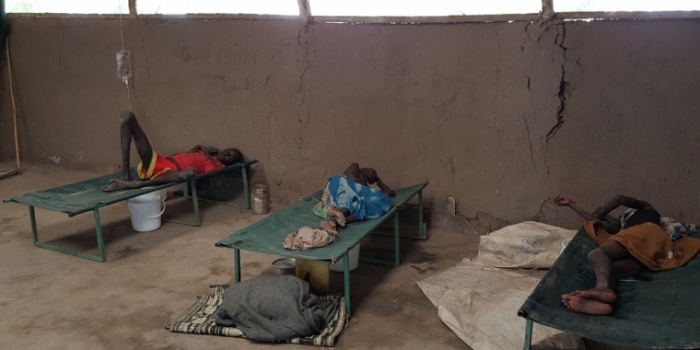The international medical charity Médecins Sans Frontières (MSF) on Friday said malnutrition and suspected cases of cholera are escalating among people sheltering in the bush near Pieri, in northeastern South Sudan, putting the health of thousands of people at risk.
In a statement seen by Radio Tamazuj, MSF said more than 27,000 people have fled their homes in Yuai and Waat in Bieh State since mid-February after clashes between the Sudan People's Liberation Army (SPLA) and opposition groups.
According to the medical charity, those who escaped to Pieri have said that civilians were shot at, raped, and killed and their houses burned to the ground.
MSF further said the living conditions of the displaced are deteriorating with many of them staying under trees and eating leaves to stay alive.
The organization pointed out that its teams are providing basic health care and treatment for cholera and malnutrition.
"I left running—there was no time to take anything," said William, 41, a father of five who fled Yuai on February 15. "They were firing their guns in the town. They killed the women, the girls, everybody in the town, and they also raped women. They burnt some of the tukuls [mud huts], they took the cattle and they even destroyed the boreholes."
Feeding on leaves, William and his family fled the town of Yuai and trekked to safety in Pieri area. But William’s five-year-old son died last week, most likely of cholera, according to medical charity Doctors Without Borders (MSF).
The first suspected cases of cholera were reported on May 9 after a general increase in patients with watery diarrhea. MSF said it has opened a cholera treatment unit in Pieri, where teams have treated more than 30 patients so far, and set up seven rehydration points and several chlorinated water points.
In mid-May, health workers reported a rise in malnutrition levels among children under five, with 32 percent suffering from general acute malnutrition and 12 percent suffering from severe acute malnutrition, which is life-threatening. MSF announced that it has distributed food rations for the malnourished children, but there is an urgent need for more food to be provided, both to local people and to displaced people around Pieri.




